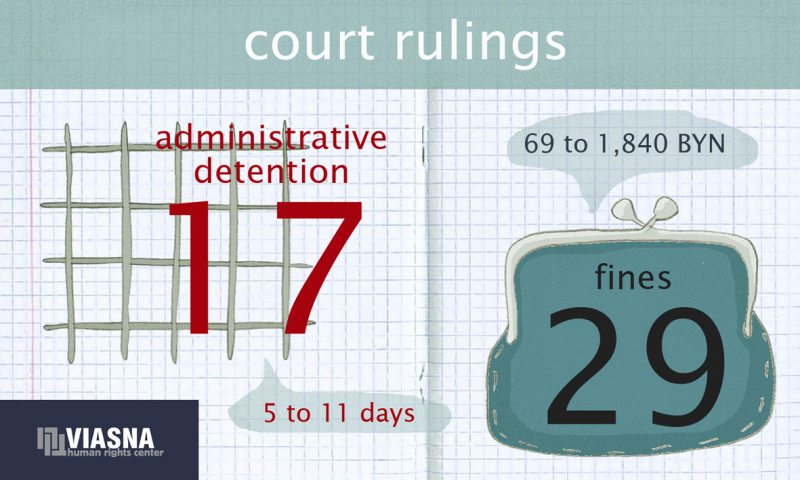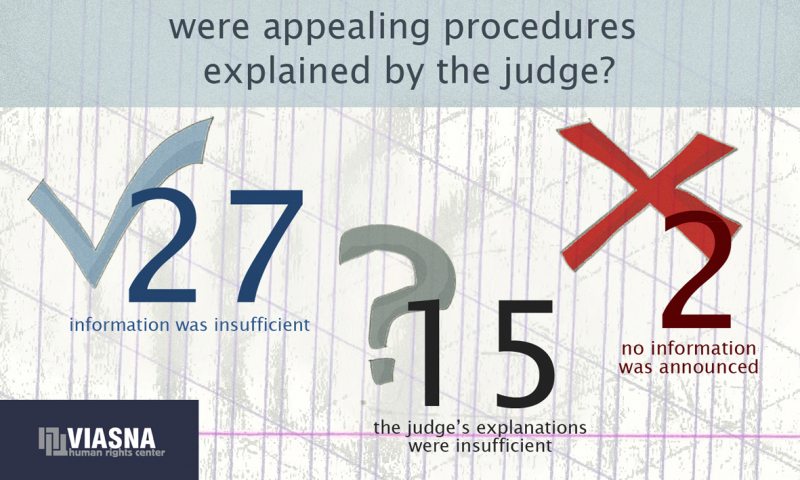Analytical review of administrative trials on March 27 in Minsk (Infographics)
Analytical review of court hearings and access to justice in Minsk during the administrative trials held on March 27 following mass arrests of protesters on 25 and 26 March 2017
The International Covenant on Civil and Political Rights, the Constitution of Belarus and other acts of legislation enshrined the concept and components of a fair trial.
In particular, a fair trial includes the right to a public hearing; this right is characterized by a public hearing of the case, both for the defendants and the public. The principle of equality of opportunity - in the collection and provision of evidence, for example, also determines the fairness of a trial.
Moreover, everyone is entitled to “adequate time and facilities for the preparation of his defence and to communicate with counsel of his own choosing; to defend himself in person or through legal assistance of his own choosing; to be informed, if he does not have legal assistance, of this right; and to have legal assistance assigned to him, in any case where the interests of justice so require, and without payment by him in any such case if he does not have sufficient means to pay for it.”
Finally, “everyone convicted of a crime shall have the right to his conviction and sentence being reviewed by a higher tribunal according to law.”
On 27 March 2017, the nine city districts of Minsk heard the charges brought against numerous protesters detained on 25 and 26 March. Information on 56 hearings was provided by the defendants (45 persons) and the observers, who attended 13 hearings, with at least one hearing in each district court. During the monitoring, the following issues were documented:
- procedure for access to the courthouse
- the availability and completeness of the information on the trials in the premises of the courts
- admission of observers to the public hearings
- explanation by the judge of the rights and obligations of persons on trial
- charges under the Administrative Code
- presence of a defense lawyer
- presence of a witness
- court ruling
- explanation by the judge of procedures to appeal against the ruling.
People were admitted to 6 of 9 trials upon presentation of their IDs. Personal information was registered in the Frunzienski District Court and in the Pieršamajski District Court. Admission to the Centraĺny District Court was free. In the Zavodski District Court, observers documented a case when a visitor was allowed to enter after her companion testified her identity verbally. An employee of the court said that he was acting according to internal rules, and was authorized to act at his own discretion in exceptional cases. Observers were subjected to a security check in the Maskoŭski District Court. This suggests that there is no single established procedure for access to the courthouses.
Observers reported lack of timely information on upcoming trials. After the opening of the courts, in most cases there were no announcements on the distribution of cases between various judges. Court staff were unable to clarify when the information would be updated. The lists were published shortly before the hearings, in the Kastryčnicki District Court - even after the start of the first meeting, so that an observer and a lawyer were only admitted to a hearing after a break. Some lists were corrected during the day. In the Centraĺny District Court, the announced time did not coincide with the actual start of the hearings, as well as in the Frunzienski District Court. The lists posted in Frunzienski District Court and in the Lieninski District Court lacked a number of cases.
The following information was published: date and name of the judge, courtroom number, time of the hearing, name the person on trial, charges under the Administrative Code.
Court staff did not create obstacles to the observers who wanted to attend the hearings, but the procedures lacked absolute accessibility. In two cases, court officers allowed only part of the observers to enter due to lack of free seats, which is contrary to the principle of openness and publicity of court proceedings. At two hearings in the Lieninski District Court, the clerks registered the personal data of those who entered the courtroom.
At a hearing in the Maskoŭski District Court, a police officer asked to switch off cell phones, which prevented the observers from recording the proceedings; however, in other cases, in particular in the same court, audio recording was allowed.
In 43 cases, at the beginning of the trial the judges read out the defendants’ rights, in three cases — they failed to do so (in the Kastryčnicki, Maskoŭski and Lieninski District Courts). In some cases, the respondents said that they did not make use of their right to a lawyer, because they did not know about such a possibility, which is evidence of insufficient information. Some respondents said that did not invite a counsel because they did not see the point.
Defense lawyers attended only 8 hearings, of which 3 – by duty counsels, and 5 – by hired lawyers. 38 remaining trials were not attended by defenders.
Police officers or riot policemen witnessed at 31 hearings, alleging that they detained the defendants. Witnesses for the detainees testified in only in three cases at the hearings in the Centraĺny, Lieninski and Zavodski District Courts. Five hearings were not attended by witnesses; at two of them reports by police officers who detained the defendants were read out.
At 27 hearings, after announcing the ruling the judge properly voiced the procedure for its appeal. 15 people considered explanations by the judges to be insufficient, although the procedure for appealing was actually voiced. At two hearings, in the Lieninski and Frunzieski District Courts, this information was not announced.
People detained on March 25 faced charges under Articles 17.1, 23.34 and 23.4 of the Administrative Code of the Republic of Belarus in various combinations. Most were charged under Article 17.1 (in 16 cases), and Articles 17.1 and 23.34 (in 16 cases). Article 23.34 was separately used 8 times, Art. 23.34 and 23.4 together - 5 times, 2 times – Art. 17.1 with 23.34, 2 times – Art. 23.4.
In 29 cases, the judges imposed fines ranging from 69 to 1,840 BYN, with a fine of 69 rubles imposed by three different judges of the Zavodski District Court under Article 17.1 of the Administrative Code, a fine of 1,840 rubles was ordered in the Centraĺny District Court under Articles 17.1 and 23.4. The average size of fines amounted at 500 BYN.
In 17 cases, the courts ordered administrative detention ranging between 5 (Zavodski, Lieninski and the Centraĺny District Courts) and 11 days (1 case in the Pieršamajski District Court). 10 days was the most common sentence of administrative detention (7 cases).
Rulings announced by the judges were not directly dependent on the charges, with each court having its preferred form and amount of administrative penalties. In particular, a judge of the Kastryčnicki District Court, who considered the majority of cases of detention on 25 March mainly imposed fines of 690-920 BYN. The least severe penalties, both in the form of fines and administrative detention, were imposed in the Zavodski District Court, regardless of the judge and charges.
Conclusions:
- the courts are not sufficiently open to the public; the Supreme Court's efforts to enhance the openness and transparency of court proceedings are insufficient and leveled by the arbitrary application of the law by officers of the court and the guards;
- the hasty procedure of hearing administrative cases and the predictable pattern of outcomes were the reason for the judges’ failure to provide sufficient information on the procedural rights of the defendants, while the persons on trial do not make full use of opportunities provided by the law for their defense;
- pre-trial detention prevents persons on trial to arrange comprehensive preparations for hearing and to choose a defense counsel; ensuring the defense of persons who do not have sufficient funds is prevented by the lack of access to free-of-charge legal aid, including on the same conditions as in a criminal trial.
Illustrated by Marla Z.





















